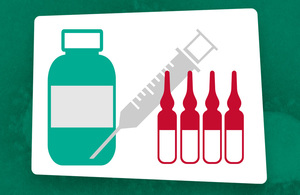Confirmation of guidance to vaccination centres on managing allergic reactions following COVID-19 vaccination with the Pfizer/BioNTech vaccine
Statement by Dr June Raine, Chief Executive of the Medicines and Healthcare products Regulatory Agency on the guidance to vaccination centres on managing allergic reactions following COVID-19 vaccination with the Pfizer/BioNTech vaccine

Dr June Raine, Chief Executive of the Medicines and Healthcare products Regulatory Agency (MHRA), said:
“We have this evening (Wednesday 9 December 2020) issued updated guidance to COVID-19 vaccination centres about the management of anaphylaxis, following two reports of anaphylaxis and one report of a possible allergic reaction following immunisation. This guidance confirms the precautionary advice to healthcare professionals which we issued yesterday evening.
“Today we convened an Expert Group of the Commission on Human Medicines (CHM), attended by experts in allergy and clinical immunology, to robustly review these reports to consider any possible mitigation on the rare risk of anaphylaxis.
“Any person with a history of anaphylaxis to a vaccine, medicine or food should not receive the Pfizer/BioNTech vaccine. A second dose should not be given to anyone who has experienced anaphylaxis following administration of the first dose of this vaccine.
“Anaphylaxis is a known, although very rare, side effect with any vaccine. Most people will not get anaphylaxis and the benefits in protecting people against COVID-19 outweigh the risks.
“Anyone due to receive their vaccine should continue with their appointment and discuss any questions or medical history of serious allergies with the healthcare professional prior to getting the jab.
“You can be completely confident that this vaccine has met the MHRA’s robust standards of safety, quality and effectiveness. The safety data has also been critically assessed by the government’s independent advisory body, the Commission on Human Medicines. No vaccine would be approved unless it meets these stringent standards – on that you can be sure.
“We have in place a robust and proactive safety monitoring strategy for COVID-19 vaccines which allows for rapid, real-time safety monitoring at population level. The fact that these incidents were picked up and reviewed shows that to be the case.
“Members of the public and healthcare professionals are encouraged to report suspected side effects through the Yellow Card scheme. We supplement this form of safety monitoring with analysis of data on national vaccine usage and anonymised GP-based electronic healthcare records, linked to other healthcare data, to proactively monitor safety.”
Background
The MHRA’s updated advice is:
-
Any person with a history of immediate-onset anaphylaxis to a vaccine, medicine or food should not receive the Pfizer/BioNTech vaccine. A second dose of the Pfizer/BioNTech vaccine should not be given to those who have experienced anaphylaxis to the first dose of Pfizer/BioNTech vaccination.
-
Vaccine recipients should be monitored for 15 minutes after vaccination, with a longer observation period when indicated after clinical assessment.
-
A protocol for the management of anaphylaxis and an anaphylaxis pack must always be available whenever the Pfizer/BioNTech vaccine is given. Immediate treatment should include early treatment with 0.5mg intramuscular adrenaline (0.5ml of 1:1000 or 1mg/ml adrenaline), with an early call for help and further IM adrenaline every 5 minutes. The health professionals overseeing the immunisation service must be trained to recognise an anaphylactic reaction and be familiar with techniques for resuscitation of a patient with anaphylaxis.
-
The individuals concerned received prompt treatment and are recovering well.
-
Like all medicines and vaccines, this vaccine can cause side effects. Most of these are mild and short-term, and not everyone gets them.
Media enquiries
News centre
MHRA10 South Colonnade
London
E14 4PU
Email newscentre@mhra.gov.uk
Telephone (including out of hours): 020 3080 7651